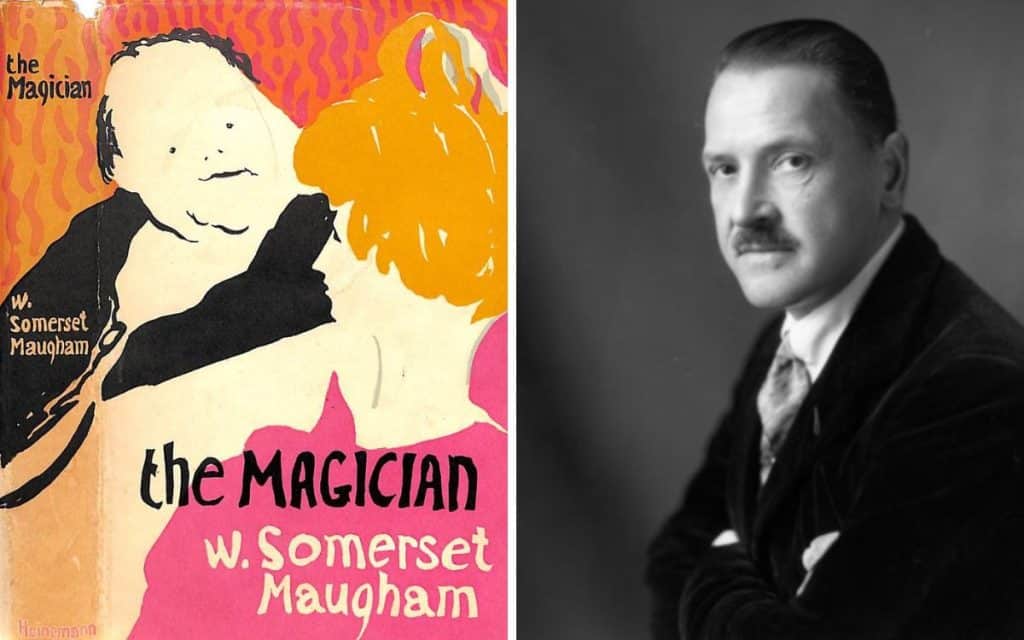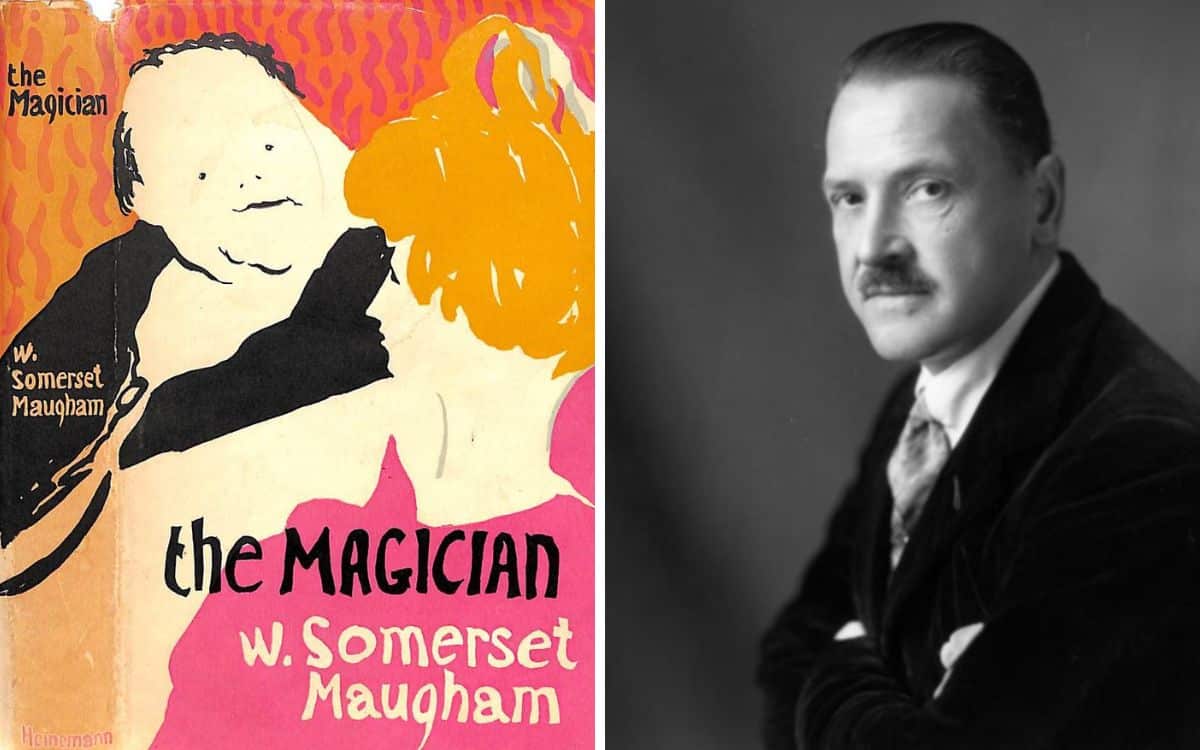W. Somerset Maugham’s 1908 gothic novella The Magician created a chilling villain inspired by real-life occultist Aleister Crowley, writes DAVID TURNBULL

The name W. Somerset Maugham isn’t one you would immediately associate with the horror genre.
But his 1908 novella ‘The Magician’ introduces a monstrously gothic character who surely deserves to be up there in the pantheon that includes Frankenstein, Dracula, Doctor Jekyll and Mr Hyde, and others.
Maugham’s first novel was written while he was studying medicine at St Thomas’s Hospital in London. Liza of Lambeth (1897) is set in Waterloo, the area that surrounds the hospital.
The novel’s main character, Liza, is a factory worker who has a tragic illicit affair with a married man. The novel caused a sensation at the time and was so successful it convinced him to give up his medical studies to focus solely on writing.
By 1906, he was enjoying modest success as both a novelist and a playwright. In the summer of that year that he returned to Paris, the city of his birth, and rented a room in a cheap hotel on the Left Bank.
It was while on this sojourn that he had an encounter with the person who would become the inspiration for Oliver Haddo, the evil villain of ‘The Magician’. That person was none other than the occultist Aleister Crowley, who, as well as dabbling in Satanism and mysticism, was an aspiring poet at the time.
Maughan was quite a superstitious person from his fourth novel onwards all his published books bore an image of the Jenman, a Moorish good luck symbol said to ward off evil spirits, on their covers.
But he wasn’t very taken by Crowley, describing him as overweight and balding, and dismissing his claims to having had supernatural experiences as lies and fakery.
Somehow though Crowley left a lasting impression and gave Maughan the kernel of an idea for a story featuring a Satanist. Back in London he delved into some research into occult matters at the British Library.
The character of Oliver Haddo is an exaggerated caricature of Crowley, grossly obese and almost completely bald, he boasts wildly of his prowess as a lion hunter, claiming to have killed three lions in one night, two of them with the same bullet. Crowley liked to refer to himself as ‘The Great Beast’ while Haddo calls himself ‘The Brother of the Shadow’.
However, unlike Maugham’s cynical opinions of Crowley, Haddo is shown to possess genuine supernatural powers, such as the ability to withstand a venomous snake bite. He is well read in terms of the Kabbalah and ancient grimoires.
In keeping with the nature of his character, he resides in a crumbling gothic mansion set on a remote and desolate heath. His mother, who is as grotesquely obese as him, is incarcerated in a nearby insane asylum.
Despite his incredible inherited wealth, he has a Jekyll and Hyde personality, regularly frequenting seedy brothels and opium dens. It’s also hinted that he possesses other powers, such as the ability to shape shift.
The plot centres on Arthur (a hospital surgeon) and his fiancée Margaret who, along with their friends Susie and Doctor Porhhoet, encounter Oliver Haddo while staying in Paris. Even though all of them find him odious and boastful he manages to wheedle his way into their circle.
Things take a turn for the worse when Haddo violently kicks Susie’s dog after it bites him. This earns him a thrashing from Arthur. Consequently, Haddo’s Machiavellian plan for revenge slowly unfolds.
He engineers a situation where he can be alone with Margaret, and then induces a trance whereby she enters a secondary world and witnesses a Black Mass. From that moment on she is under his thrall, so besotted with him she leaves Arthur and marries Haddo.
But all of this is not simply an extreme act of revenge on Arthur. Haddo does not consummate the marriage. He needs Margaret’s virgin blood for his experiments in creating the grotesque new life forms that he keeps in huge bell jars in the attic of his mansion. It’s up to Arthur, Susie, and the Doctor to try and save her from a fate worse than death.
When Crowley read the novel, he was so incensed by this depiction of himself that he wrote a scathing full page review which was published in Vanity Fair.
In it he accused Maughan of plagiarism, citing works as diverse as HG Wells’ ‘Island of Doctor Moreau‘ and ‘The Life of Paracelsus’ by Franz Hartmann. Maugham avoided reading the review, claiming later: “I daresay it was a pretty piece of vituperation, but probably, like his poems, intolerably verbose.”
Inspiration for W. Somerset Maugham’s The Magician
Reading the novel, it is clear Maugham had turned to the classics of horror for inspiration.
Doctor Porhoet has some occult knowledge and plays a similar role to Van Helsing in Dracula, Haddo’s laboratory is like Doctor Jekyll’s, his attempt to create new life is more than a passing nod to Frankenstein. The climax, in the tradition of ‘Fall of the House of Usher’ and others has Haddo’s mansion burning to the ground and taking all of its dark secrets with it. However, drawing inspiration from the works of others is far from the brush of plagiarism Crowley unfairly attempted paint Maugham with.
Crowley also attempted to get Maugham to pay him some money, firing off an urgent telegram stating that he would surely starve to death if the author didn’t immediately send him £25. Again, Maugham ignored this, treating it as a scam. Crowley didn’t starve and nothing untoward happened to Maugham because of any supernatural act of revenge Crowley may have considered. On the other hand, maybe the Moorish good luck symbol did its job and afforded him some protection?
In 1926 ‘The Magician’ was made into one of the earliest horror films by pioneering silent movie director Rex Ingram. For some considerable time, it was considered to be a lost film. But copies were subsequently found and restored.
With the recent box office success of Robert Eggar’s remake of F.W. Murnau’s Nosferatu, ‘The Magician’ is possibly another silent era horror classic that deserves a modern reimagining.
Whether this happens or not, ‘The Magician’, over a century after its publication, is still certainly worth a read.
Have you read The Magician by W. Somerset Maugham? Tell us your thoughts in the comments section below!



